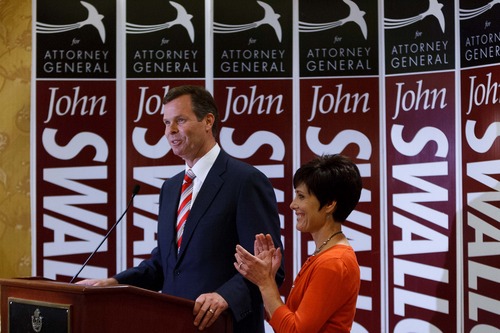This is an archived article that was published on sltrib.com in 2013, and information in the article may be outdated. It is provided only for personal research purposes and may not be reprinted.
As two top state leaders are already under investigation, the Senate passed a bill Monday to form a new independent ethics commission for the executive branch.
It voted 25-1 to pass SB86, and sent it to the House.
Its sponsor, Sen. John Valentine, R-Orem, noted that similar commissions exist for the Legislature and local officials. He said the lack of one for the executive branch became apparent when Attorney General John Swallow became the target of a federal investigation for allegedly attempting to help a Utah businessman bribe officials as he was under investigation by the Federal Trade Commission.
Soon thereafter, Lt. Gov. Greg Bell became the target of a probe after intervening in a child-abuse investigation and pushing for an audit of the case.
The bill would create a five-member commission to investigate ethical complaints brought by two or more citizens in a secret setting and then issue a public report spelling out the wrongdoing or quietly vindicating the target.
The ethics commission would have authority to hear complaints about any of the state's five elected officials — governor, lieutenant governor, attorney general, treasurer and auditor — but not rank-and-file state employees and not for violations occurring before March 14.
Valentine said a system is already in place for other state employees or political appointees who violate ethics rules, and they can be reprimanded or fired.
Sen. Jim Dabakis, D-Salt Lake City, who is also chairman of the Utah Democratic Party, voted against the bill saying the public may think the commission has more power than it actually does.
He dislikes such provisions as requiring dismissal of complaints if details are leaked to the press, not allowing sanctions other than impeachment, and requiring four of five commissioners to vote for sanctions to proceed. Valentine said other commissions have identical provisions.
Later, Matt Lyon, executive director of the Utah Democratic Party, issued a statement calling the bill a "stunt, so Republican politicians can pat themselves on the back, pretend to make serious ethics changes, and then do nothing."
Lyon said, "The ethics panel proposed in this bill will come into play only after a public official has pleaded guilty, no contest, entered a plea in abeyance, or has been convicted of a crime. This goes against basic principles of logic — the appropriate time for an investigation is after allegations have been made, and before judgment has been rendered."



